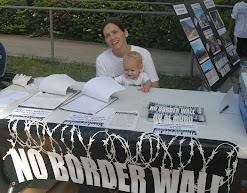The rugged deserts and mountains of Arizona’s southern border can be a treacherous place. Josseline was fourteen years old when she and her little brother crossed the U.S.-Mexico border, hoping to reunite with their mother in California. Walking for days, Josseline got sick and fell behind her group and the coyote that led them.
Three weeks later, Dan Millis was among the humanitarian aid volunteers that stumbled across Josseline's lifeless body in a remote canyon along the border. Since then, Millis has come to know that the costs of fatally flawed U.S. border policies extend beyond the tragic deaths of border crossers like Josseline. Walls push crossers into more remote desert terrain. Border ecosystems and the federal laws that protect them have also been cast aside by costly, ineffective, environmentally destructive, and inhumane attempts to "secure the border."
The Lower Rio Grande Valley Sierra Club is proud to co-sponsor presentations by Dan Millis in Brownsville on Monday, August 22, and in San Juan on Tuesday, August 23 respectively. Millis will tell how he was ticketed, dragged to court, and convicted of "littering" after leaving drinking water for migrants along border desert trails shortly after he found Josseline. Now working for the Sierra Club in Tucson, Dan will also discuss the environmental impacts of border walls and other enforcement measures. He will share stories of trans-national friendship and offer tips on which border walls are easiest to climb. Most importantly, Millis will speak up for the people and places victimized by border walls and enforcement-only politics and invite you to join in the fight.
Please join us Monday, August 22 at Galeria 409 in Brownsville, TX and Tuesday, August 23 at St. John the Baptist Parish Hall in San Juan, TX. Both presentations begin at 7:00pm. Refreshments will be served.
Monday, August 22 at 7:00pm Galeria 409 in Brownsville, Texas
Directions to Galeria 409, 409 E. 13th St.: From Expressway 77/83 in Brownsville, exit International and go south. Turn right onto Washington. Turn left on E 12th. Turn left on Levee St. Turn left onto E 13th. Galeria 409 is on the left in the middle of the block between Levee and Elizabeth streets. Parking is available at meters on Levee and Elizabeth, and there's a big parking lot on Levee and E 12th.
Tuesday, August 23 at 7:00pm St John the Baptist Parish Hall in San Juan, Texas
Directions to St John the Baptist, 216 W. 1st St.: From Expressway 83, exit Raul Longoria/Nebraska exit in San Juan and turn south on Nebraska. Turn right on 1st St. You will see the tower on the right. The Parish Hall is just past the tower. Parking is on the west and north side of the church complex.
Friday, July 15, 2011
Monday, July 11, 2011
Write your member of Congress - Oppose HR 1505
An assault on America's public lands and environmental laws has been introduced in the U.S. House of Representatives, bearing the ironic name "National Security and Federal Lands Protection Act" (HR 1505).
Over 30 federal protection laws would be waived in a zone that extends 100 miles into the United States from all land borders and coasts. Roughly two-thirds of the U.S. population lives in the area targeted by this waiver. Cities from San Francisco to Boston and national parks from Glacier to Everglades could be put at risk.
And if that weren't enough, HR 1505 prohibits the Departments of the Interior and Agriculture, which oversee our national parks, wilderness areas, and wildlife refuges, from taking any actions to preserve the natural integrity of the lands that they oversee if their actions or advice conflict with the desires of the Department of Homeland Security (DHS).
HR 1505 is using national security as a cover to attack environmental laws and protected lands. DHS has not expressed a need for these harmful provisions. In fact, DHS testifies that public land managers are not getting in the way of their operations. Last October, the Government Accountability Office found that "most [Border Patrol] agents reported that land management laws have had no effect on Border Patrol's overall measure of border security."
Visit the Sierra Club page to send an email to your member of Congress, telling them to oppose HR 1505:
https://secure2.convio.net/sierra/site/Advocacy?cmd=display&page=UserAction&id=6239
Over 30 federal protection laws would be waived in a zone that extends 100 miles into the United States from all land borders and coasts. Roughly two-thirds of the U.S. population lives in the area targeted by this waiver. Cities from San Francisco to Boston and national parks from Glacier to Everglades could be put at risk.
And if that weren't enough, HR 1505 prohibits the Departments of the Interior and Agriculture, which oversee our national parks, wilderness areas, and wildlife refuges, from taking any actions to preserve the natural integrity of the lands that they oversee if their actions or advice conflict with the desires of the Department of Homeland Security (DHS).
HR 1505 is using national security as a cover to attack environmental laws and protected lands. DHS has not expressed a need for these harmful provisions. In fact, DHS testifies that public land managers are not getting in the way of their operations. Last October, the Government Accountability Office found that "most [Border Patrol] agents reported that land management laws have had no effect on Border Patrol's overall measure of border security."
Visit the Sierra Club page to send an email to your member of Congress, telling them to oppose HR 1505:
https://secure2.convio.net/sierra/site/Advocacy?cmd=display&page=UserAction&id=6239
Subscribe to:
Comments (Atom)

